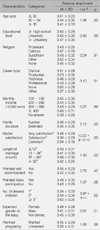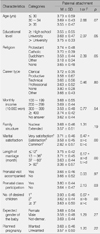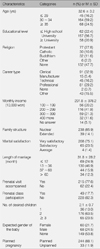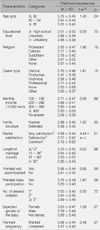Abstract
Purpose
This study aims to provide foundational data for preparing for educational programs on the roleof a father that are designed to help primiparous spouses carry out the paternal role successfully.
Methods
This study was conducted in two OB/GYN clinics and a study sample of 277 primiparous spouses who satisfied the selection criteria was selected.
Results
Of the correlation among the childhood experiences, paternal attachment and role of a father of the subjects, the childhood experiences had a positive correlation with the paternal-infant attachment and the role of a father. The paternal-infant attachment and the role of a father also had a positive correlation.
Conclusion
An infant is influenced primarily by his or her parents, who will have immense influences on the child's growth and development. Since the paternal-infant attachment is closely related to the role of a father, thedevelopment of positivepaternal-infant attachment must be preceded in order for a primiparous spouse to carry out the role of a father successfully. Therefore, the development of nursing intervention programs is needed to foster the proper understandingof the roleof a father, accommodate the practical needs of primiparous spouses and nurture the paternal-infant attachment for the promotion of realistic, successful role of a father.
Figures and Tables
Table 5
Differences in the level of childhood experiences according to general characteristics of primiparous spouses (N=277)

Table 6
Differences in the level of paternal attachment according to general characteristics of primiparous spouses (N=277)

References
1. Belsky J., Vondra J. Luster T., Okagaki L, editors. Developmental origins of parenting: Personality and relationships factors. Parenting: An ecological perspective. 1993. Hillsdale: Lawrence Erlbaum;227–250.
2. Bowlby J. The making and breaking of affectional bonds. 1979. New York: Tavistock.
3. Cho H.S. The parent's child experience and children's attachment. 1996. Seoul: The Catholic University of Korea;Unpublished master's thesis.
4. Chun N.M. The effects of childbirth education on primipara's childbirth experience and postpartum maternal adaptation. 2001. Seoul: Seoul National University;Unpublished master's thesis.
5. Chung H.S. A study of development of the Korean-marital satisfaction scale. J Korean Acad Fam Med. 2001. 39(11):89–106.
6. Epstein S. The mother-father-peer scale. 1983. University of Massachusetts at Amherst;Unpublished manuscript.
7. Greenberg M., Morris N. Engrossment: The newborn's impact upon the father. Am J Orthopsychiatry. 1974. 44(4):520–531.

8. Heo M.W. A study on the marital life and satisfaction of middle age man and women. 2004. Seoul: Ewha Womans University;Unpublished master's thesis.
9. Hwang E.J. The comparison of paternal attachment and role confidence to newborn between participation group and non-participation group in family delivery room. 2003. Busan: Kosin University;Unpublished master's thesis.
10. Jung M.K. Maternal parenting experience, depress, marital conflict, & parenting behavior predicting school children's adjustment. J Korean Home Econ Assoc. 2003. 41(8):123–137.
11. Kang N.M. Theoretical structure model for stress in transition to fatherhood. 1996. Seoul: Seoul National University;Unpublished doctoral dissertation.
12. Kang R.H. Determinants of father role performance. J Korean Acad Fam Med. 2000. 38(6):15–28.
13. Kim N.Y. A study on the effect of parents's experiences from childhood on their child's attitude of acceptance of emotional expressions. 2002. Seoul: Unpublished master's thesis.
14. Kim Y.S. Effect of program for the marital satisfaction, communication, mutual acceptance of couples in the early stage of marriage. 2003. Seoul: Korea University;Unpublished master's thesis.
16. Kim J.H. The comparison of paternal attachment to high-risk newborn and normal newborn. 2002. Seoul: Ewha Woman's University;Unpublished masters thesis.
17. Kim H.J. The variable related to father's child rearing practices and involvement behavior. 1997. Seoul: Ewha Womans University;Unpublished master's thesis.
18. Lee E.H. A study on the pregnancy experience of the primiparous couple: The transition to parenthood. Bulletin Nurs. 1996. 10(2):252–253.
19. Lim J.A., Yoo E.K. A study on the effects of father class upon fathers level of knowledge and confidence about postpartal woman and newborn care. Korean J Women Health Nurs. 2002. 8(3):345–357.

20. Nichols F.H., Humenick S. Childbirth education: Practice, research, and theory. 2000. Philadelphia: WB Saunders.
21. Nugent J.K. Culture and psychosocial influences on the father's role in infant development. J Marriage Fam. 1991. 53:475–485.
22. Park E.S., Kim E.K., Won J.W., Oh W.O., Suk M.H., Im Y.J. The parent-child relationship in traditional korean society described in Korean classic novels. J Korean Acad Nurs. 2002. 8(4):469–481.
23. Park K.J. The comparison of paternal attachment to newborn between rooming-in and nursery systems. 1999. Seoul: The Catholic University of Korea;Unpublished master's thesis.
24. Park M.S., Kim H.W. A study on primigravida's antenatal self-care behavior and maternal knowledge. Korean J Women Health Nurs. 2000. 8(1):119–128.
25. Park S.Y., Jeun H.J. Childhood experience, personality, and marital satisfaction: Relationship to parenting behaviors. Korean J Child Stud. 1999. 20(3):153–169.
26. Simons R.L., Beaman J., Conger R.D., Chao W. Childhood experience, conceptions of parenting and attitudes of spouses as determinants of parental behavior. J Marriage Fam. 1993. 55:91–106.
27. Steel H., Steel M. Attachment and psychoanalysis: Time for reunion. Soc Dev. 1998. 7(1):92–119.
28. Sung M.H., Joo K.S. The relationship between the childhood experience and childrearing attitude of primipara. J Korean Soc Mat Child Heal. 2007. 11(1):1–9.
29. Woo J.H., Lee M.S., Jeon C.A. The relationship between fathers' marital satisfaction, child rearing attitude and children's social competence. J Korean Home Econ Assoc. 2002. 41(12):91–101.




 PDF
PDF ePub
ePub Citation
Citation Print
Print








 XML Download
XML Download